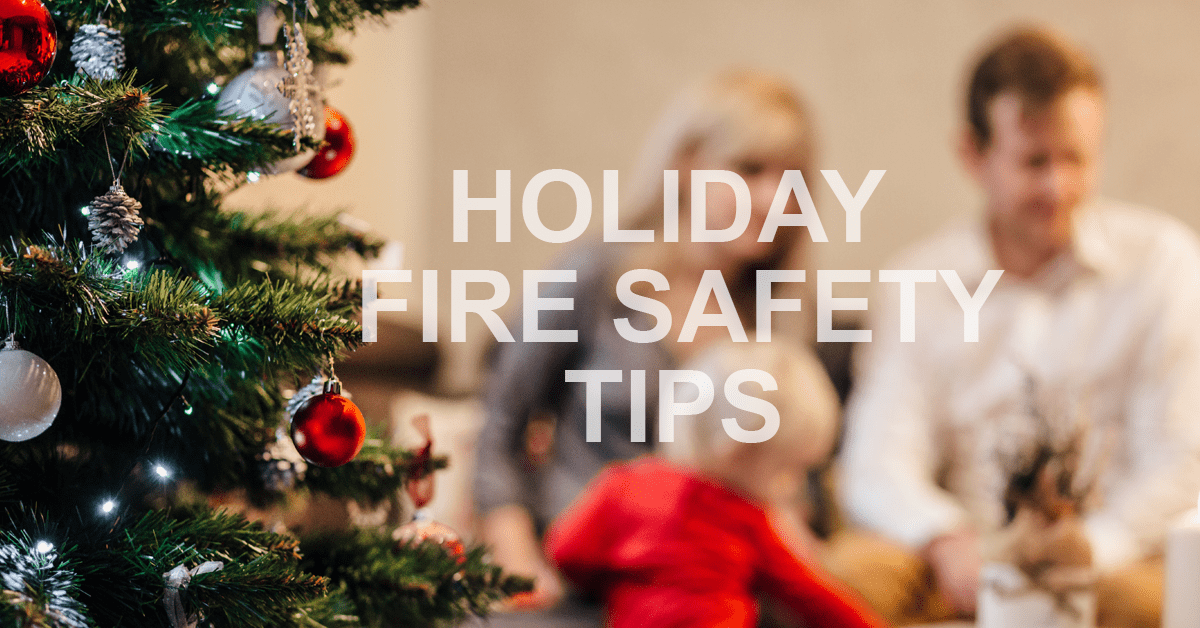Tis’ The Season – For Fire Safety
The winter holiday season can be fun – decorating, entertaining, and celebrating with family and friends. The season is also prone to more fire hazards. Here are some ways to minimize your fire risk this season.
Smoke Alarms
Start your holidays right. Test all your smoke alarms and change out batteries. If you don’t have smoke alarms, this is a good time to install them. Smoke alarms save lives.
Fireplaces
Make sure your fireplace is well maintained. Chimney soot can accumulate over time and eventually catch fire. Be sure your fireplace has a protective closure, either glass or metal, to keep embers from escaping into the room. Do not use paper or flammable liquid to start fires. Keep furniture, rugs, and decorations away from an active fireplace. And never leave a fire burning unattended or burning overnight.
Candles
During the holidays, candles are used in many homes for religious reasons and are popular decorations used to set that special holiday ambiance. Left unattended or improperly placed candles can lead to disaster.
Candles need to be placed on a sturdy surface out of reach for children and pets, and away from flammable materials including drapes. Never leave candles unattended and always make sure candles are out before retiring for the night.
Christmas trees
Fresh cut trees are awesome and smell great. In winter, when you run your heat around the clock, cut trees can dry out very quickly. Dry Christmas trees are a fire hazard.
Do not put your tree near the fireplace or another source of heat. Make sure you water your tree daily and be sure to turn off lights before going to bed. Most tree fires occur from leaving tree lights on all night long.
Even with daily water, your cut tree can catch fire and burn very quickly. It is best to take your tree down soon after Christmas. The longer you leave it up, the great the chance of a tree fire.
Electrical Circuit Overload
You may want your home to sparkle for the holidays, just don’t overdo it. Safety must take priority over a dazzling light show, especially in older homes that aren’t wired for today’s electrical loads. Overloaded circuits can lead to a fire. And because these fires can occur within the walls, they can be hard to detect and extinguish quickly.
Verify all light strands have been tested for safety by an independent laboratory. Check for a label. Follow directions for safety, don’t hang indoor lights outside – or vice versa –and don’t plug too many items into an electrical socket. Don’t string together more than 3 strands of lights. And, don’t connect LED lights and non-LED light strands.
Damaged Holiday Lights
Reusing light strands for decorating is common. But before you do, be sure to inspect each strand. Look for shattered bulbs and exposed wires. Broken light strands are often the cause of Christmas tree fires. Even after the strands are up, make sure pets are kept away so that they don’t pull on or chew through strands.
If you have older lights, replace them with more energy-efficient LED lights which are cooler and reduce energy and the risk of fire. LED lights are shock resistant and shatterproof too.
Christmas trees present a significant fire risk. According to the National Fire Protection Association, from 2007 to 2011, firefighters across the nation responded to 230 house fires that began with a Christmas tree. Those fires resulted in 6 deaths, 22 injuries, and $18.3 million worth of property damage. Overall holiday lights are responsible for 150 home fires each year.
Space Heaters
Space heaters are a popular way to heat rooms that don’t seem to warm up quickly. But space heaters also present a serious fire hazard. If you are using a space heater, be sure it is in good condition and the wires are not cracked or broken. Coils should be guarded, not accessible to touch. Never place space heaters next to beds, drapes, or other furniture. And never leave a space heater unattended or on all night long. Extension cords should not be used with space heaters. Always follow the manufacturer’s instructions for setting up and using a space heater. If your space heater is older than 7 years, replace it with a more energy-efficient model. Newer models meet higher fire safety guidelines as well.
Better still, find out why your rooms aren’t heating properly. Rooms that heat slowly are often a sign that your home is under-insulated. Upgrading attic insulation is a cost-effective way to ensure rooms heat evenly and retain heat longer.
RED CROSS SAFETY SITE
Click here to visit the Red Cross Safety Site. The site offers ways to keep your family safe including suggestions on how to respond should a fire ever break out in your home.
Attic Air
We provide insulation and ventilation services to homeowners in Chicago & All Suburbs. Want a more energy-efficient home this winter? Call us for a free assessment at 630.830.3870


